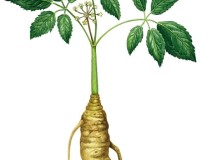
In Korea the use of ginseng is even more common than multivitamins in the West. According to surveys, vitamins are found in half of all Western households; in the Korean study 69 percent of the men and 51 percent of the women used the plant extract. The researchers did not distinguish between ginseng tea, capsule or other forms of supplement.
Classical herbals, such as Shen Nong Ben Cao Jing – which translates roughly as The Divine Farmer’s Medicine Chest – describePanax ginseng as having life lengthening properties. The book is a compilation of entries written between 300 BC and 200 AD. However, until now there were no modern scientific studies demonstrating the life extending effect of ginseng on humans.
Out of this study came that both male and female ginseng users lived longer than non-users. The graph below shows the effect of Panax ginseng on the length of life of the men in the study. The lower graph shows the effect on the women.
Now it could be that ginseng users are richer, better educated or simply more health aware. When the researchers filtered for these factors statistically, they saw that Panax ginseng only had a significant reduction on the risk of mortality for men and not for women.
The simplified table below shows the chance of death, fatal cardiovascular disease and fatal forms of cancer for regular users and non-users. Where P is less than 0.05 there is a significant difference between the chances,
Risk of death is set at 1 for the non-users. Then it becomes clear that men who take ginseng regularly have a lower chance of dying. The research does not provide any clues as to how Panax ginseng extends life span in men.
Panax ginseng is one ingredient in a life-extending cocktail that Canadian researchers are experimenting with.
Source:
J Altern Complement Med. 2009 Aug; 15(8): 921-8.


